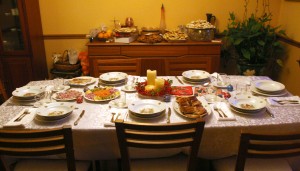My First Wigilia
Attending your first Wigilia (also known as Polish Christmas Eve) after years of politely declining invites is a little like being the last person you know to watch Avatar. You know you’ll like it—you’ve been hearing about how great it is from all your closest friends. You’ve heard stories recounting the highlights for years. But actually being there, experiencing the whole thing all the way through has somehow eluded you just yet.
So it was with a sense of nervous anticipation that I prepared for my first Wigilia with my husband’s family. I had never spent Christmas away from my own family, and since it’s the one holiday a year we are guaranteed to all sit in each other’s presence, telling the same old stories, it made me a little sad to think I was breaking a 25-year-old tradition.
The lead up to the big night was a dizzying mélange of cookie baking, tree trimming and family gossip. My sister-in-law Christine had promised a “special announcement” from her and her boyfriend, which provided many moments of delicious speculation with my in-laws. Would it be an engagement or just a job promotion?
It’s an old Polish Catholic tradition to fast all day Christmas Eve, at least until the special meal is served (though many do not follow this tradition anymore and only forego meat). This, I knew, posed a problem for me. While I admire the spiritual discipline of forgoing food to focus the mind and heart on loftier matters, hunger pangs can make me as grumpy as Ebenezer Scrooge. Luckily for me, my father-in-law Ignacy slipped me some contraband cheese before dinnertime rolled around.
One of the most sacred Polish Christmas traditions is the breaking of the opłatek, an impossibly thin wafer with an impression of the nativity on it. Everyone at the table breaks off a piece of the Christmas wafer and gives it to another, offering a blessing for the New Year. On the spot, I wanted to be clever and specific. (“Best wishes for house-training your new puppy.”) But really, it’s hard to improve on “Merry Christmas and a happy New Year,” though most Poles do give heartfelt, detailed wishes in addition to the traditional blessings.
The table was adorned with the Misztal’s best china, which they brought with them from Poland when they left in the 80s. Each piece features a hand-painted scene of a lord and lady. We set a place for one extra diner, an old tradition to remind us to keep our hearts and homes open to the needy. The sparkle of the crystal glasses, the shimmer of the satiny table cloth, and the glow of the candles all hint that something special is about to happen.
Then we ate and ate. We ate the kind of meal soldiers at war dream about returning to, the kind of meal you spend years trying to recreate in your own kitchen. Course after course sailed out of the kitchen, carefully prepared and served by my blindingly capable and lovely mother-in-law. There was borsht, with big savory vegetable flavor and a hint of sweetness from the beets. Finely minced salmon with lemon tastes amazingly spread on toast with a squeeze of lemon. Briny herring, chewy cabbage rolls and sweet poppy noodles came next, all followed by a finale of perfectly fried fish. Every last morsel was rich, simple and satisfying, but never heavy.
Later, we sang carols in Polish around the beautifully decorated and illuminated tree. We took Holy Communion at midnight mass. Christine announced her engagement to a delightful, dark-haired young man. But it was in that moment, bathed in the golden warmth of the dining room and the pride of my mother-in-law that I knew that I had not lost my family Christmas, but had multiplied it. There, with a family who has kept its traditions through the brutality of communism and the hegemony of the American Christmas, I was filled with love, laughter, and pierogi.


